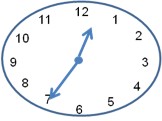June, who works the night shift, administers a medication to Mr. Docherty at the time shown on this clock. She will chart that the medication was given at ________. (Use the 24 h system.) 
Fill in the blank(s) with the appropriate word(s).
0035
Since she is working the night shift, the time shown must occur after midnight. The first hour after midnight starts with 00 in the 24 h system.
You might also like to view...
A client recently started on chemotherapy states, "The doctor told me my stem cells were down. A stem cell sounds like something on a flower! What did the doctor mean?" Which response by the nurse provides the best explanation?
1. "Stem cells are found in your bone marrow. They can turn into red blood cells, white blood cells, or platelets, depending on what your body needs at the time. Right now, your body is producing fewer than it should." 2. "Did the oncology nurse give you a copy of the pamphlet that discusses the unwanted effects of chemotherapy?" 3. "Bone marrow depression is a common side effect of chemotherapy, but it can be treated." 4. "The complete blood count you had yesterday showed a decrease in the number of stem cells. Your doctor is keeping you informed."
Intestinal flora can cause infection if they are accidentally spread to the urinary tract.
Answer the following statement true (T) or false (F)
The nurse teaches a class for the public about diabetes mellitus. Which individual does the nurse assess as being at highest risk for developing diabetes?
1. The 38-year-old client who smokes one pack of cigarettes per day 2. The 42-year-old client who is 50 pounds overweight 3. The 50-year-old client who does not get any physical exercise 4. The 56-year-old client who drinks three glasses of wine each evening
The nurse is caring for a patient who has developed an increased temperature during the first 24 hours postoperatively. Which of these actions is a priority for the nurse to take?
a. Providing passive range of motion exercises b. Encouraging coughing and deep breathing c. Giving antipyretic medication d. Restricting oral fluids